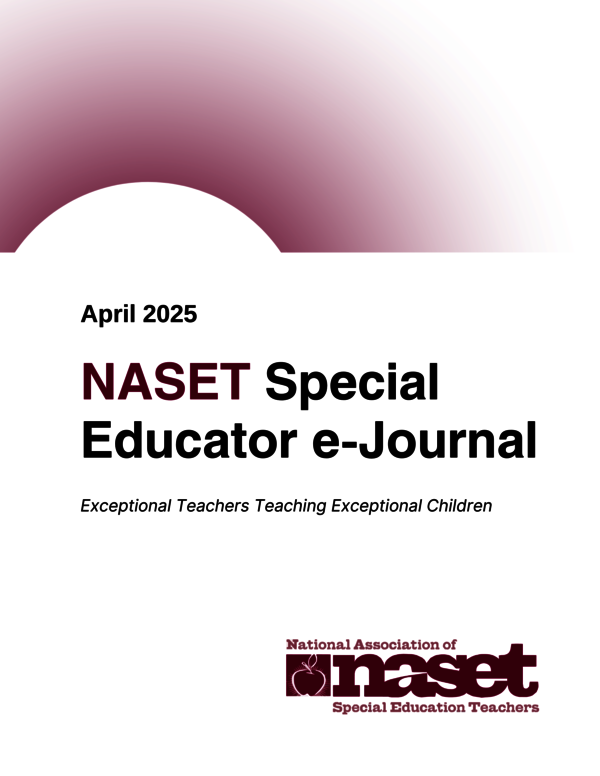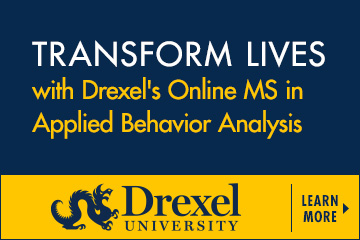April 2025 - Special Educator e-Journal

Download a PDF Version of This e-Journal
NASET Members - Login to Access
Not a Member? - Join NASET Today!
Table of Contents
- Buzz from the Hub
- Special Education Legal Alert. By Perry A. Zirkel
- Update from the US Department of Education
- How Family Expectations Influence the Educational Outcomes of Children with Disabilities. By Ruelle J. Merkman
- Neuroplasticity in Neurocorrection: Creating New Neural Connections for the Restoration of Children's Cognitive Functions. By Irina Bakhshiian
- Osteogenesis Imperfecta. By Dr. Faye J. Jones
- Parental Challenges in Supporting the Executive Functional Skills of Learners with Special Needs. By Dr. Marlon Villaver Jr.
- Effectiveness of Technology and its Effects on Families of Children with Autism. By Daphanie Richards
- Latest Employment Opportunities Posted on NASET
- Acknowledgements
NASET Members - Login Below to access the latest Special Educator e-Journal.
Site visitors: You may access a sample e-Journal - Sample e-Journal
Buzz from the Hub
- OSEP Releases Two New Fast Facts: Part B Educational Environments and Part B Personnel
- National Resource Center for Supported Decision-Making
- English Learners with Disabilities Toolkit
- Financial Education
- Non-Regulatory Guidance Supporting High-Quality Preschool with Title I Funds: Guidance to Local Educational Agencies and Schools on Implementing the Required Head Start Program Performance Standards for Title I-Funded Preschool Programs
And Many More Articles
NASET Members - Login to Access the Full Article
Not a Member? - Join NASET Today!
Special Education Legal Alert
By Perry A. Zirkel
© March 2025
This month’s update provides (a) quick summaries of current legal developments under the IDEA and Section 504, and, on the next page (b) a recent court decision specific to “504-only” students (i.e., those not also covered by the IDEA.) For previous monthly updates and related publications under these federal laws, see perryzirkel.com
NASET Members - Login to Access the Full Article
Not a Member? - Join NASET Today!
Update from the US Department of Education
March 20, 2025. Statement on President Trump’s Executive Order to Return Power Over Education to States and Local Communities
Secretary of Education Linda McMahon released the following statement following President Trump’s Executive Order to return education to the states:
“Today’s Executive Order is a history-making action by President Trump to free future generations of American students and forge opportunities for their success. We are sending education back to the states where it so rightly belongs.
“Education is fundamentally a state responsibility. Instead of filtering resources through layers of federal red tape, we will empower states to take charge and advocate for and implement what is best for students, families, and educators in their communities.
How Family Expectations Influence the Educational Outcomes of Children with Disabilities
By Ruelle J. Merkman
Abstract
Parents have a powerful influence on the educational paths of children with disabilities. From the literature articles reviewed, it became clear that family expectations impact academic engagement, success at school and postsecondary activities. The literature review analyzes recent research focusing on socioeconomic status, cultural factors, mental health, and disability types as key influencing factors. Findings suggest a higher parental expectation leads to improved academic performance and engagement, while lower parental expectations tend to be associated with a lack of progress in education. Disparities due to these issues can be addressed through parental education, mental health interventions, and collaborations between schools and families. Recommendations include policy interventions and culturally responsive strategies to bridge expectation gaps and foster success for children with disabilities.
NASET Members- Login to Access the Full Article
Not a Member? - Join NASET
Neuroplasticity in Neurocorrection: Creating New Neural Connections for the Restoration of Children's Cognitive Functions
Irina Bakhshiian, Master
Special Education Teacher, Independent Researcher
Russia
Abstract
This article examines the role of neuroplasticity in the neurocorrection of cognitive functions in children with special educational needs. Modern methods of special pedagogy are analyzed, including neuropsychological exercises, play therapy, sensorimotor correction, and cognitive-behavioral therapy (CBT). The importance of early intervention and a comprehensive approach in corrective work is emphasized.
Keywords: neuroplasticity, neurocorrection, cognitive functions, special pedagogy, corrective methods.
NASET Members - Login to Access the Full Article
Not a Member? - Join NASET Today!
Osteogenesis Imperfecta
By Dr. Faye J. Jones
Osteogenesis imperfecta (OI) is an inherited bone disorder that is present at birth (Osteogenesis Imperfecta | Johns Hopkins Medicine). It is also known as brittle bone disease (Osteogenesis Imperfecta: What It Is, Symptoms & Types). An infant born with OI usually have soft bones that break or fracture easily, bones that are not formed normally, and many other problems. OI symptoms range from mild to severe.
NASET Members - Login to Access the Full Article
Not a Member? - Join NASET Today!
Parental Challenges in Supporting the Executive Functional Skills of Learners with Special Needs
By Dr. Marlon Villaver Jr.
Abstract
This study investigates the challenges faced by parents in supporting the functional skills of learners with special educational needs during the post-COVID-19 pandemic. Utilizing a qualitative research design, the study employed interview guides to collect data from parents. The research explored parents' lived experiences as they navigated the demands of facilitating their children’s learning at home through Interpretative Phenomenological Analysis (IPA). The findings revealed eight key themes: (i) the critical need for guidance in supporting children’s functional skills; (ii) the importance of understanding the unique needs of their children; (iii) the struggle of balancing work and at-home education; (iv) parents’ emotional commitment to their child’s progress; (v) difficulties in maintaining their child’s attention and motivation; (vi) the value of effective teaching strategies; (vii) parents managing dual roles as caregivers and educators; and (vii) the gaps in resources and support. The study recommends that schools offer structured training programs for parents, create accessible resources tailored to special educational needs, and maintain regular communication between educators and parents. Policymakers should also establish community-based support systems to ease the burden on families. This research highlights the vital role of parental involvement in developing the functional skills of learners with special needs and calls for collaborative efforts to ensure inclusive and effective education, especially during crises.
Keywords:
Executive functioning skills, parental challenges, modular learning, special education
NASET Members - Login to Access the Full Article
Not a Member? - Join NASET Today!
Effectiveness of Technology and its Effects on Families of Children with Autism
By Daphanie Richards
Abstract
The literature review conducts an inquiry into developing a deeper understanding of the support that technology offers children with autism and the resources that are available to their families. Understanding the resources and technological support accessible to families of children with autism was the main focus of this literature review. The review highlights the possible advantages, challenges, and best practices of utilizing technology to assist children with academic requirements. To assist families of children with disabilities, the research focuses on telehealth services to aid interventions, AAC strategies, and reducing distractions through the use of visual and auditory support. By examining and interpreting existing research, this review will illuminate the potential benefits, challenges, and best practices associated with the use of technology to support students with autism.
Keywords: Alternative Augmentative Communication, visuals, auditory, adaptive technology, accommodations, intervention, telehealth
NASET Members - Login to Access the Full Article
Not a Member? - Join NASET Today!
Latest Employment Opportunities Posted on NASET
* Director of Student Services K-5 - The Director is responsible for overseeing, coordinating, and supporting student-related services (such as ESOL, Learning Center, Nativ program, and Learning Profiles) and advocating for the whole child. To learn more - Click here
* Statewide Low Vision Specialist/TVI Contract Manager - This position, which is jointly supervised by the Maryland State Department of Education (MSDE) and The Maryland School for the Blind (MSB), has the statewide leadership responsibility to ensure quality programs and services for students who are blind or visually impaired. To learn more - Click here
* Special Education Teacher- $58/hr - The ideal candidate will be flexible, enthusiastic, and passionate about making a difference in the lives of students with disabilities. This position is responsible for developing and delivering individualized education plans (IEPs), fostering a safe and engaging classroom environment, and collaborating with other educators and parents to ensure the academic success and emotional well-being of each student. To learn more- Click here
* Student Learning Support Teacher 2025-26 - High Meadows School in Roswell, Georgia, approximately 30 minutes north of Atlanta, is accepting support teacher applications for the 2025-2026 school year. The school takes pride in hiring dynamic, compassionate, and diverse faculty and staff who are among the finest in their areas of expertise. To learn more- Click here
* Special Education Teacher - Join our team in the delivery of special education programming in collaboration with a dynamic partnership with clinical services in a school aged program. We provide small class sizes, ongoing supervision, and a comprehensive holistic approach to grade levels from kindergarten through eighth grade. This candidate will be responsible for the delivery of educational services to children in a classroom setting in a lead role. To learn more- Click here
* School Psychologist - The School Psychologist assesses, counsels, and supports students and families to improve social, emotional, behavioral, and academic outcomes. This role involves collaboration with school staff, parents, and external stakeholders to develop and implement intervention strategies, assessments, and support plans to facilitate student success. To learn more- Click here
* Special Education Teacher - Performs functions including; planning and delivering specialized instructional lessons that meet each individuals’ goals contained within the Individual Education Plan and other targeted interventions; creating a classroom environment that is conducive to learning; and employing effective specialized instructional techniques for learners with disabilities. To learn more- Click here
* Licensed Special Education Teacher - Provide education and behavior modification approaches in a small class, highly structured alternative school. The special education teacher will function as a member of a treatment team, which will address the educational, and emotional/behavioral needs of the students as set forth in the IEP and in the treatment plan. To learn more- Click here
Acknowledgements
Portions of this or previous month’s NASET’s Special Educator e-Journal were excerpted from:
- Center for Parent Information and Resources
- Committee on Education and the Workforce
- FirstGov.gov-The Official U.S. Government Web Portal
- Journal of the American Academy of Special Education Professionals (JAASEP)
- National Collaborative on Workforce and Disability for Youth
- National Institute of Health
- National Organization on Disability
- Substance Abuse and Mental Health Services Administration
- U.S. Department of Education
- U.S. Department of Education-The Achiever
- U.S. Department of Education-The Education Innovator
- U.S. Department of Health and Human Services
- U.S. Department of Labor
- U.S. Food and Drug Administration
- U.S. Office of Special Education
The National Association of Special Education Teachers (NASET) thanks all of the above for the information provided for this or prior editions of the Special Educator e-Journal
